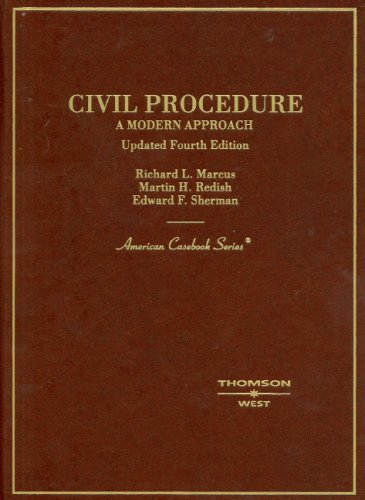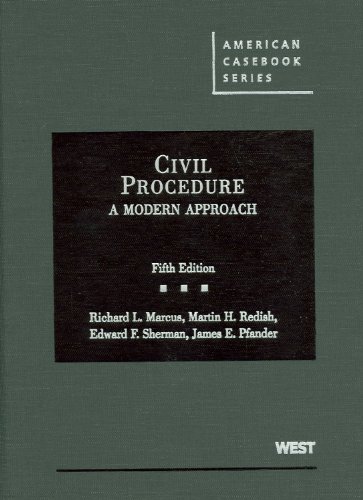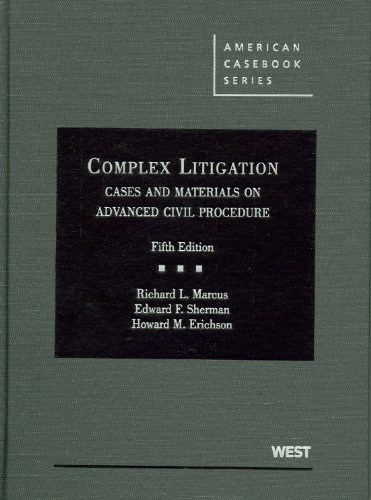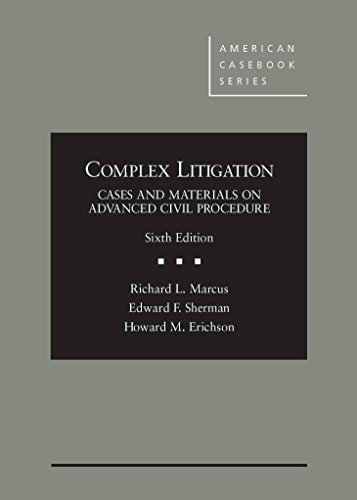Background
Sherman, Edward Francis was born on July 5, 1937 in El Paso, Texas, United States. Son of Raphael Eugene and Mary (Stedmond) Sherman.


(The Fourth Edition and its three paperback break-outs off...)
The Fourth Edition and its three paperback break-outs offer detailed information about the current use of ADR techniques in a variety of settings. In its treatment, for example, of the problem of arbitration agreements in employment contracts and other contracts of adhesion, or recent controversies over mediator ethics, mediator credentialing, and required participation in court-ordered mediation, it contains abundant and timely discussion found in no other book on the market. The Teacher’s Manual contains a large number of detailed exercises for classroom use.
http://www.amazon.com/gp/product/1599410540/?tag=2022091-20

(This Updated 4th Edition revises the casebook to account ...)
This Updated 4th Edition revises the casebook to account for the restyling of the Federal Rules of Civil Procedure. The pagination has not changed from the 4th Edition (2005). Students will be alerted to the new numbering and wording of the Rules; but teachers can continue to use their current versions of the 4th edition as originally published. On December 1, 2007, the restyled Federal Rules went into effect. The hope is that this restyling will pay dividends for decades, and that beginning law students will be among the first beneficiaries. For them, the restyled rules will be the only rules they will know in their professional careers. We assume that most teachers will have their students read and learn from the restyled rules. But this watershed does not change what's in the decided cases under the rules as they were written before Dec. 1, 2007. So students may find it unnerving for their rule pamphlets to say something different from what they find quoted in the cases in the casebook. The Updated 4th Edition is designed to deal with these issues. It has been changed only to reflect changes in numbering or wording of the rules that resulted from the restyling project. Teachers who have been using the 4th edition as published in 2005 can continue to use it; they need not start working afresh with the updated 4th edition. To facilitate that continued use of the existing book, we will soon circulate a listing of the changes in this revised edition. Teachers will therefore be able simply to annotate their copies of the original 4th edition and have the equivalent of what the students possess in the updated 4th edition. In addition, the authors have added an Appendix including two post-publication decisions that were previously handled by circulating edited versions suitable for class handouts--Bell Atlantic Corp. v. Twombly and Exxon Mobil Corp. v. Allapattah Services, Inc. The authors have included footnotes on the pages where they recommend substituting these cases to refer readers to them. In 2009, we expect to publish the 5th edition. That will, of course, be based on the restyled rules, but it move far beyond the minimal accounting for small numbering and wording changes resulting from restyling. We are pleased to announce that Professor James Pfander, of Northwestern University Law School, will be a new co-author on the 5th edition.
http://www.amazon.com/gp/product/0314191011/?tag=2022091-20

(The fifth edition of this successful casebook continues t...)
The fifth edition of this successful casebook continues the authors' commitment to addressing the cutting edge issues of contemporary procedure. The new edition contains a revamped treatment of pleadings, important recent Supreme Court decisions, modified presentation of class action issues, expanded attention to electronic discovery, and a thoroughly-revised chapter on appellate review. Throughout, the textual material and Notes and Questions have been updated and revised to make them effective for a 21st century course.
http://www.amazon.com/gp/product/0314184953/?tag=2022091-20

(This casebook provides a foundation for handling a wide v...)
This casebook provides a foundation for handling a wide variety of complex litigation cases, including civil rights, torts, and securities. The fifth edition offers expanded treatment of multidistrict litigation, new material on the Class Action Fairness Act, and a new section on litigating class certification. The authors have created a new chapter on settling complex cases, allowing students to understand the special issues that arise in class action settlements and in non-class aggregate settlements. Materials on discovery and judicial management have been streamlined and updated.
http://www.amazon.com/gp/product/0314199608/?tag=2022091-20

(For 30 years, this casebook has been the staple of Comple...)
For 30 years, this casebook has been the staple of Complex Litigation courses. It covers a wide variety of cases – civil rights, mass torts, securities, consumer rights – and provides a strong foundation for classroom coverage regarding any type of complex litigation. The current edition retains the book's familiar broad coverage while adding coverage of important recent developments. The class action chapter includes the recent Supreme Court class-action decisions. The first chapter has been revised to provide more consideration of the role of complex litigation in private enforcement of public norms. The book's treatment of multidistrict litigation has grown substantially in recognition of its increasing prominence, including a new section on the BP Oil Spill litigation. The treatment of electronic discovery takes account of ongoing changes in practice and further revisions expected in the Federal Rules. As in the past, teachers will be able to address a variety of contemporary issues using this book. And as in the past, teachers will receive further support in preparing to address these changing subjects. A comprehensive Teachers' Manual and annual Teachers' Updates are expected.
http://www.amazon.com/gp/product/1628101423/?tag=2022091-20

( The sixth edition of this successful casebook continues...)
The sixth edition of this successful casebook continues the authors' commitment to providing professors and their students with the tools to address both foundational questions and cutting edge procedural issues in a practical way that is attuned to today's legal practice. It contains an expanded treatment of the increasingly important topic of pleading practice, and additional emphasis on electronic discovery issues. It also offers carefully edited versions of recent Supreme Court cases like Ashcroft v. Iqbal and J. McIntyre Machinery, Ltd. v. Nicastro, along with textual and note material to identify and highlight the critical issues. The class-action section contains presentations on Wal- Mart v. Dukes and the key issues raised by the Court's decisions on class-action waivers in arbitration clauses that are appropriate for first-year students. Throughout, the material has been updated and revised to focus on the critical issues of 21st century practice. As with prior editions, the authors will provide a thorough Teachers' Manual, which they will supplement with annual Teachers' Updates to keep teachers entirely up-to-date.
http://www.amazon.com/gp/product/0314278990/?tag=2022091-20
Sherman, Edward Francis was born on July 5, 1937 in El Paso, Texas, United States. Son of Raphael Eugene and Mary (Stedmond) Sherman.
Georgetown University (Bachelor of Arts, 1959). University of Texas, El Paso (Master of Arts, 1962). Harvard University Law School (Bachelor of Laws, 1962.
Doctor of Juridical Science, 1981).
Bar: Texas 1962, Indiana 1976. Aide to governor Nevada, state government fellow, Carson City, 1962. Law clerk to the United States district judge Western district Texas, El Paso, 1963.
Partner firm Mayfield, Broaddus & Perrenot, El Paso, 1963-1965.
Teaching fellow HarvardLaw School, Cambridge, Massachusetts, 1967-1969. Professor Indiana U. School Law, Bloomington, 1969-1977.
Fulbright professor Trinity College, Dublin, 1973-1974. Visiting professor, Stanford Laws School, 1977.
Edward Clark Centennial professor of law, U.Tex., Austin, 1977-1996.
Professor, dean law Tulane Law School, 1996. Counsel Texas County Jail Litigation, 1978-1985. Board directors, officer Travis County Dispute Resolution Center, Austin, 1985-1988.
Visiting professor Stanford Law School, 1977, 97, U. London, 1989, Chuo University, Tokyo, 1995.
Chairman, Board Of Directors Texas Resource Center, 1989-1995, Texas Center Public Policy Dispute Resolution, 1993. Member arbitrator panel, course director International Centers for Arbitration.
Captain United States Army, 1965-1967, lieutenant colonel Reserve, 1970-1990. Fulbright lecturer in law Trinity College, Dublin, Ireland, 1973-1974.
( The sixth edition of this successful casebook continues...)
(The Fourth Edition and its three paperback break-outs off...)
(The fifth edition of this successful casebook continues t...)
(This casebook provides a foundation for handling a wide v...)
(This Updated 4th Edition revises the casebook to account ...)
(For 30 years, this casebook has been the staple of Comple...)
Captain United States Army, 1965-1967, lieutenant colonel Reserve, 1970-1990. Fellow Texas Bar Foundation. Member American Bar Association (reporter civil justice improvements project 1993, offer of judgment task force 1995, committee pro bono public service 1997-1999, chairman task force on class action legislation 2002-2003, reporter American Bar Association Task Force on Asbestos 2003-2005, Robert McKay award for advancement of justice by law professor 2004), American Arbitration Association (arbitrator panel), American Association of University Professors (general counsel 1986-1988), American Law Institute, Texas State Bar Association (alternative dispute resolution committee 1985-1996, chair pattern jury charge committee 1983-1994, Evans Texas Bar award for excellence in dispute resolution 1998), Texas Civil Liberties Union (general counsel 1985-1991), Louisiana Law Institute, Louisiana State Bar (board governors 1997-1999, committee codes of lawyer and judicial conduct 1999-2001, committee on multi-juris. practice since 2000).
Louisiana Bar Foundation (judicial liason committee 1999-2001), Association American Law Schools (chairman Section Litigation 1999, chairman Section ADR 1995, committee on clinical legal education 1999-2002).
Married Alice Theresa Hammer, February 23, 1963. Children: Edward F. Junior, Paul.
